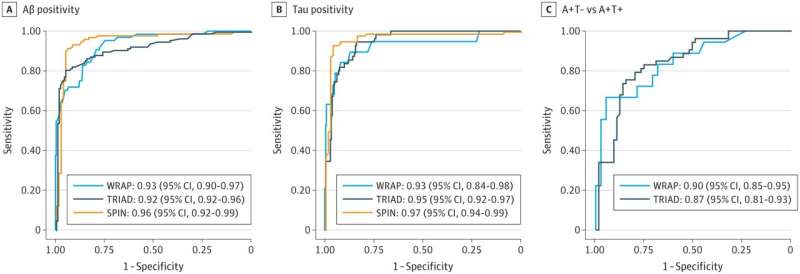This article has been reviewed according to Science X's editorial process and policies. Editors have highlighted the following attributes while ensuring the content's credibility:
fact-checked
peer-reviewed publication
trusted source
proofread
Detecting Alzheimer's disease using a blood test could be just as accurate as standard lumbar punctures

Findings from a study led by researchers in Sweden have suggested that a commercial blood test could detect Alzheimer's disease as accurately as standard lumbar punctures. The blood test detects "p-tau217," a form of the protein tau, which is a hallmark protein of Alzheimer's disease.
The study has been published in the journal JAMA Neurology.
Experts welcomed the findings. "In the past year, we have seen incredible progress in the development of blood-based Alzheimer's tests. And as we see more and more different types of tests becoming available, studies like this are key to understanding which are most accurate,", said Dr. Sheona Scales, Director of Research at Alzheimer's Research UK.
People with Alzheimer's have a build-up of proteins known as amyloid and tau in their brain, which is one of the main ways to detect the disease. Alzheimer's is generally diagnosed based on people's symptoms, such as thinking or memory problems. However, only 2% of people with a dementia diagnosis receive one through "gold standard" methods, such as PET scans or lumbar punctures.
Improving diagnosis will be even more vital with the imminent arrival of new Alzheimer's disease therapies. "Coming down the line are potentially ground-breaking new drugs which can slow the progression of early-stage Alzheimer's disease," said Dr. Richard Oakley, Associate Director of Research and Innovation at Alzheimer's Society. "But for people to be eligible for them if they're approved in the U.K., they will need an early, accurate diagnosis. This study is a hugely welcome step in the right direction."
In this new study, levels of p-tau217 in the blood reflected the levels of amyloid and tau proteins seen in brain scans and lumbar punctures. "Before any blood tests can become standard diagnostic tools, they must be independently shown to be at least as sensitive and accurate as gold-standard approved tests, such as lumbar punctures," said Dr. Scales, who added that the test "has huge potential to revolutionize diagnosis for people with suspected Alzheimer's."
"What's particularly promising about the new study is that the researchers used a cut-off threshold to group people into those who were very likely to have Alzheimer's, those who were very unlikely to have the disease, and an 'intermediate' group who would need further tests using conventional methods like lumbar punctures or PET scans," said Dr. Scales. Using a blood test in this way, the researchers predict, could reduce the demand for these follow-up tests by around 80%.
However, there are still unanswered questions, said Dr. Scales. "We need to gain a better picture of how these types of blood tests perform day-to-day in real-world health care systems, including more diverse patient populations," Scales continued. Also, similar to new treatments, blood tests need to go through regulatory approval before they can be used in a health care setting, she added.
To address these issues, Dr. Scales highlighted the Blood Biomarker Challenge launched in in 2023, a project led by Alzheimer's Research UK, Alzheimer's Society, and the NIHR. The project will involve working with world-class researchers to pilot the implementation of new blood tests in the NHS that can diagnose Alzheimer's disease earlier and more accurately than current methods.
People deserve a quick and accurate diagnosis, which will "ultimately bring us closer towards a cure for dementia" said Dr. Scales.
More information: Nicholas J. Ashton et al, Diagnostic Accuracy of a Plasma Phosphorylated Tau 217 Immunoassay for Alzheimer Disease Pathology, JAMA Neurology (2024). DOI: 10.1001/jamaneurol.2023.5319


















